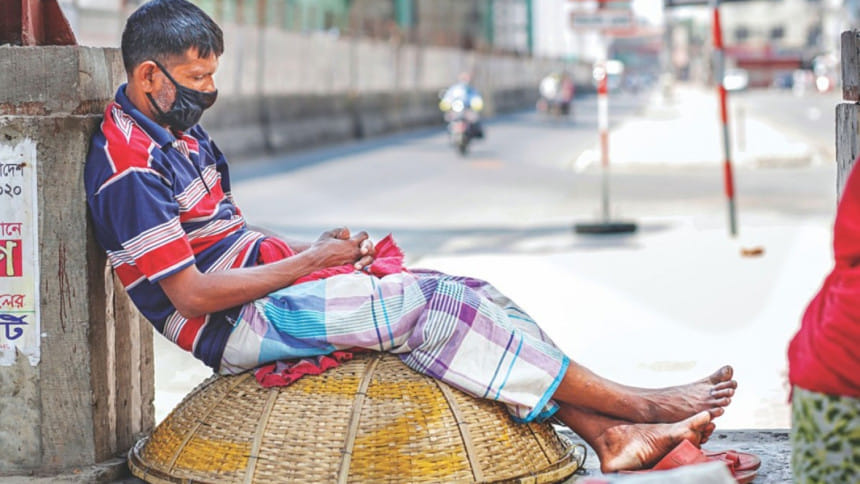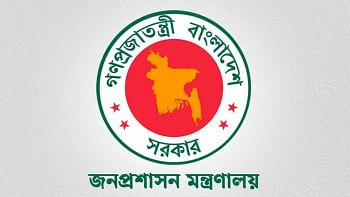All hands on deck

The government should focus on safeguarding the livelihoods of the low-income people and fortifying its health facilities to combat the coronavirus rather than fixating on maintaining the growth momentum, said economists yesterday.
"For the time being we should not pay much attention in achieving the mid-term and long-term targets of sustainable development goals (SDG) or whether GDP growth is going to be the same as before," said eminent economist Wahiduddin Mahmud at a webinar styled "Covid-19: Linking Economic and Health Concerns" organised by the Bangladesh Institute of Development Studies.
It is now more important to take steps to ensure that the low-income people do not slip into poverty, he said, adding that the health sector must get equal attention.
"The Covid catastrophe has made it clear how fragile the health sector is -- because of incompetency or irregularity," he said, adding that apart from these, there was also negligence in government allocation for the sector.
He went on to call for maintaining Covid precautions like mask wear, social distancing and frequent hand washing indefinitely since the financial costs for lockdowns needed to bring down the infections and fatalities are high.
"We seem to lack the discipline to enforce lockdown and ensure Covid measures -- and it is a governance issue," said Rehman Sobhan, chairman of the Centre of Policy Dialogue.
If the infection increases dramatically, as was the case in neighbouring India, it may go beyond the capacity of the health sector, Mahmud said, while highlighting the low government allocation for the health sector.
"The government expenditure for the health sector is less than 1 percent of our GDP, which is not the case in countries of our level," he said, while citing the case of Vietnam, where the allocation for public health is 7 percent of GDP.
If the capacity of the public health sector is enhanced by increasing the allocation, it will have long-term benefits, Mahmud added.
"What if we face a similarly dire situation as in Delhi, Maharashtra, Tamil Nadu and West Bengal over the next 2-3 weeks once the lockdown is lifted?" asked Binayak Sen, director-general of BIDS.
Bangladesh's health system might not be able to face the onslaught of in-patients.
"If we need to go for a hard lockdown option for another 2-3 months, can we sustain it? What is the cost of guaranteed social protection for the poor and the vulnerable non-poor for the next 2-3 months especially in large cities?"
Subsequently, he went on to call for a realistic revision of the growth targets.
"If we can achieve even a 5 percent GDP growth rate, that would be a great achievement in a COVID year. But, we need to support agriculture and health sectors along with remittance and exports."
The health sector is a particular concern, as it was not able to absorb even a significant fraction of the earmarked resources, Sen added.
Planning Minister MA Mannan echoed the same as Sen.
"Simply allocating money is not enough."
Last year, the planning ministry had hastily approved two health-related projects with support from the World Bank and the Asian Development Bank.
But the health ministry could not complete the projects.
Responding to a query about the projects during question-answer session of the programme, the minister said, "You cannot consider a point with still picture."
"My duty was to allocate money and I did it… As per I know, they have handled it well. They are using the money… And the work is going on," he said.
The government is trying to take steps coordinating between saving both lives and livelihoods, he said adding that damage control is the government's main strategy at present.
It has been alleged that poor people are not getting government assistance, said Moshiur Rahman, economic affairs advisor to the Prime Minister.
The major problem in reaching assistance to the poor and low-income people, especially in rural areas, is the difficulty in getting information on those who need the assistance.
"Many low-income people who are suffering from a financial crisis do not even express it," he said, adding that the government can centrally fix the allocation.
Similarly, ensuring the informal sector workers are getting the aid from the stimulus packages has proven to be a tricky affair, Rahman added.
Meerjady Sabrina Flora, additional director general at the DGHS, said, "If a working person, who could have contributed to the government's revenue earning, dies, livelihood would be affected permanently."
Underscoring the need for arresting the spread of the virus, she urged for coordinated efforts as the government cannot do it all alone.
Regarding the fragile health sector that came to the fore after the onset of Covid, she said: "The progress made in the public health sector before Covid was praised globally."
Not only Bangladesh but many developed countries faced difficulty in providing health services after the arrival of coronavirus, nobody had experience in this regard and thus it would not be wise to blame Bangladesh alone.
Anir Chowdhury, policy advisor to the a2i Programme of the Prime Minister's Office, made a presentation on the government's use of technology and big data in containing the damage of the first wave of coronavirus cases last year and in Covid-related service delivery.
The government has been able to slow the spread of the virus by going for zone-based lockdown, enabled by mobile signal.

 For all latest news, follow The Daily Star's Google News channel.
For all latest news, follow The Daily Star's Google News channel. 



Comments